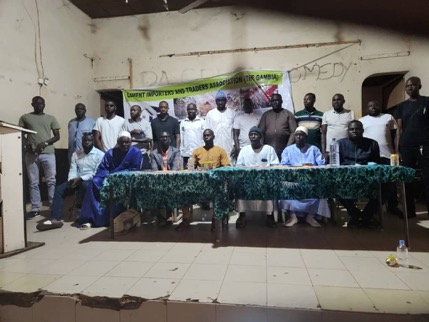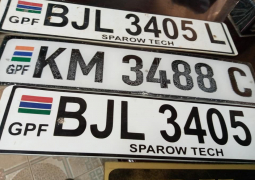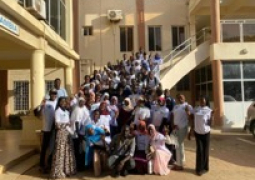
This called was made on Sunday at a presser convened by the association to update the public on the looming cement scarcity facing the country.
Sheikh Cham, an executive member of the association, while welcoming government’s recent move to allow their stranded vehicles with cement at the border, stated that the recent decision to allow vehicles stranded at the border comes at a time when the country is fast running out cement.
Cham reminded that government in its earlier announcement assured that there is enough cement in the country that can last for the next six months.
"A vessel loaded with cement anchored on 1 June and before 8 June the cement is finish. Now, we’ve seen Jah Oil vehicles travelling to Senegal to load cement, something that raise questions."
Cham informed that cement business is a capital-intensive enterprise and that the recent move to increase tax on imported cement would only cause a huge economic loss to Gambians.
He also refuted claims held by government that most of the people involved in the cement business in the country are foreigners, confirming that all their 116 members are all Gambians.
"We feel that government should empower all of us, rather than stopping us and allow only Jah Oil to engage in cement business. This is a big surprise to us. He (Jah Oil) is not the only Gambian and his company is not a State-Owned Enterprise like NAWEC or Gamtel. Jah Oil is a private company."
In spite of the capacity of Jah Oil, Cham believes that shouldn’t be a basis to stop other Gambians from doing cement business in the country.
He made reference to the fact that Jah Oil also started the same way by importing cement from Senegal and even today his company is importing cement from Senegal.
Quizzed as to what possible measures they intend to pursue, Cham reminded that they have almost exhausted all the avenues to engage government over the issue to be able to reach a consensus.
"Authorities need to look at the interest of Gambians. It is a right for Gambians whenever at any time to have access to cement to be able meet their construction needs."
He also flagged the alarming rise in the price of cement in communities, noting that the move is also denying the country an exorbitant amount of monies in revenue.
"Each vehicle truck buys fuel of 400 liters of which, the government has at least D21 per litre. Also, any truck crossing the Senegambia Bridge pays an amount of D2000 to and fro which costs each truck D4400. So the amount of monies that government is losing is huge.’’ he said.
Cham opined that government is misinformed that the cement available in the country can last for six month, which he said, is far from the reality.
The recent move to monopolise cement business to only few businessmen, he added, is not good for our economy.
"If there is no competition in the market’, individual businessmen are at liberty to sell their commodities at whatever price."
While acknowledging that no construction development is attainable without the availability of cement, Cham appealed to government to rescind its recent move to ensure robust development.
With a growing membership, CITA also creates over 3000 jobs directly indirectly.



